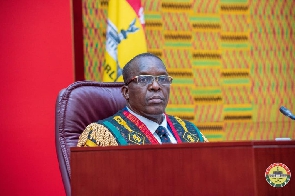Alban Sumana Kingsford Bagbin, the Speaker of Parliament has bemoaned the high turnover of Members of Parliament (MPs) under the Fourth Republican Constitution of Ghana.
“By the tenure of the Sixth Parliament (of the Fourth Republic), I was the only remaining MP from the first Parliament in the House,” the Speaker stated in his presentation at the 2024 Alumni Lecture of the University of Ghana.
“As at now, there is none, since as a Speaker, I am no longer an MP. The only survivor from the first 61 MPs from the New Patriotic Party (NPP) in the Second Parliament is Honourable Osei Kyei–Mensah–Bonsu, who has also voluntarily opted out of the House.”
The lecture, which was organised by the University of Ghana Alumni Association in collaboration with the University of Ghana, was on the theme “30 Years of Parliamentary Democracy: The Journey Thus Far.”
The Speaker noted that in the 1996 elections, only 69 of the 200 MPs in the First Parliament returned to the House and that 112 were returned from the Second to the Third Parliament, following the 2000 elections.
Speaker Bagbin said most MPs do not go past one term of office; citing that the Seventh Parliament had 182 new entrants in the current 275 – Member Chamber and only 92 continuing members, most of whom could not be described as “old hands”.
“This high attrition rate of MPs is affecting the growth and development of Parliament in so many ways such that currently there are second-term MPs who are holding leadership positions,” he said.
“Also, the effectiveness of Parliament as a valuable institutional memory and experience is being quickly lost.”
The Speaker said the strength of every Parliament was in experience; and that it takes time to understand and practice the culture and law of Parliament and to cultivate the right attitude, habits, skills and competencies to be an effective and efficient MP.
Touching on the achievements/dividends of Ghana’s democracy, Speaker Bagbin, said despite the above shortcomings, there were some achievements to celebrate.
He said that over the last 32 years, Ghana had maintained a stable democratic system with peaceful transfers of power, which had produced for the country, a stable political system.
“To a large extent, our political system is seen to be legitimate. Leaders are elected and not imposed. They are chosen through processes that are perceived as fair and representative,” he said.
And added: “This legitimacy has helped ensure that the successive governments and legislatures have the broad support of citizens, reducing the likelihood of widespread dissent or unrest that characterized the early years of our nationhood.”
He said in addition, Ghana’s democratic system had provided structured mechanisms for addressing and resolving our differences; adding that since the inception of the Fourth Republic, Parliament has passed over one thousand Bills.
With regards to the expansion of the civic space, he said over the last 30 years, a key cornerstone of the expansion of the nation’s civic space had been the legal and institutional frameworks that successive Legislatures had helped to establish laws and institutions that protect fundamental rights such as freedom of speech, freedom of assembly, and freedom of association.
The Speaker said the nation’s press freedom had led to the promotion of diversity of opinions and viewpoints.
Madam Doris Kisiwa Ansah, Chairman, University of Ghana Alumni Association, said the Alumni Lectures since its inception in 1974 had hosted lecturers amongst Alumni of the University, addressing various topics spanning governance, business, science and education.
She said these lectures sought to highlight issues that directly impact the body politics of this nation.
Professor Nana Aba Appiah Amfo, Vice Chancellor, University of Ghana, who noted that the University had achieved a 51 per cent female to 49 per cent male enrolment ratio, expressed the hope that it was possible to have a future Parliament of Ghana with 50 per cent female MPs.
General News of Saturday, 21 September 2024
Source: GNA













